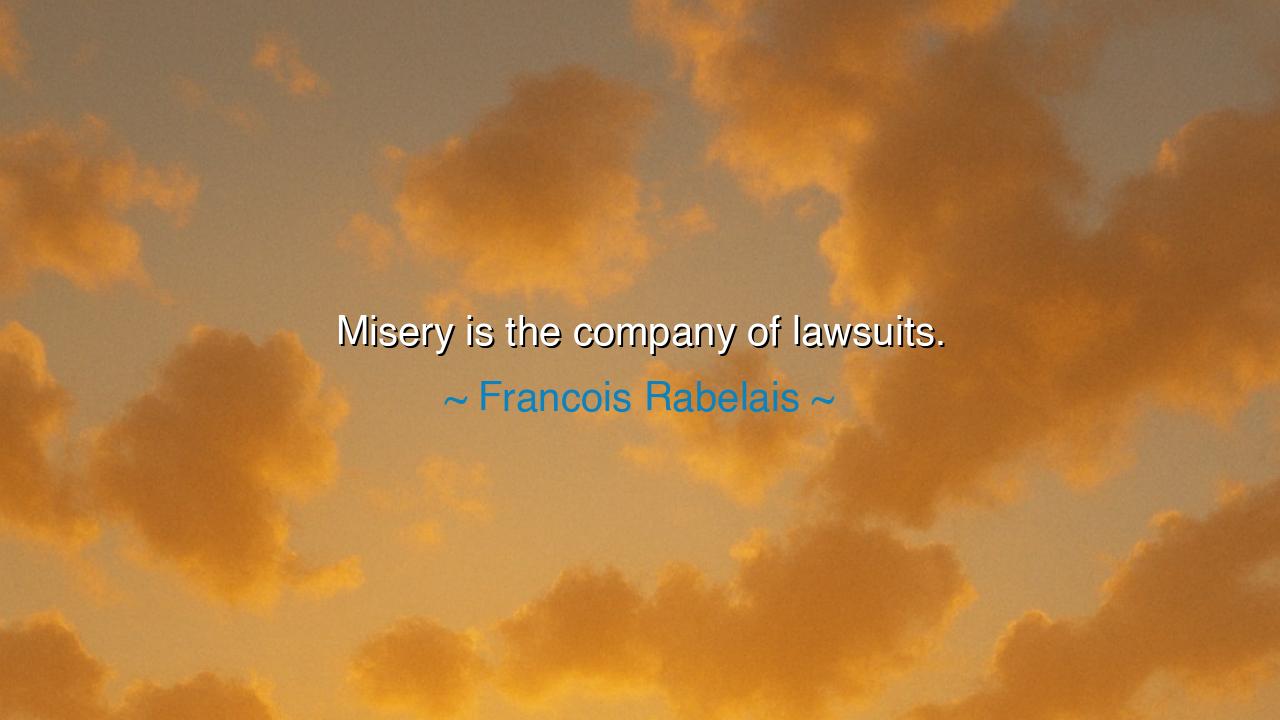
Misery is the company of lawsuits.






Hear, O listener, the wry but piercing words of François Rabelais, the Renaissance satirist and philosopher, who declared: “Misery is the company of lawsuits.” Though uttered in jest, it is no lighthearted remark—it is a truth carved from the very marrow of human struggle. For Rabelais, who lived in an age of kings, merchants, and endless quarrels, saw clearly that wherever the courts were invoked, there misery lingered like a shadow, clinging to both victor and vanquished alike.
The meaning of this saying lies in the recognition that a lawsuit, while meant to be the path to justice, is also a road paved with strife. It drains the spirit with delays, devours wealth with endless fees, and poisons relationships with suspicion and anger. Even the winner often emerges diminished—pockets lighter, friendships broken, peace of mind shattered. Thus Rabelais reminds us that litigation rarely brings true relief; rather, it multiplies misery, spreading it like wildfire across all who touch it.
History offers vivid testimony. Consider the case of Charles Dickens’ Jarndyce v. Jarndyce, the infamous lawsuit immortalized in Bleak House. Though fictional, it was drawn from real English chancery cases that dragged on for decades. Generations of heirs lived and died waiting for resolution, their fortunes consumed entirely by the lawyers and the courts. By the time judgment was rendered, nothing remained but bitterness and ruin. Here the truth of Rabelais’s words blazes forth: the law’s delays and entanglements can turn the quest for justice into a pit of suffering.
Nor is this lesson confined to the distant past. In modern times, great corporations and ordinary citizens alike have been ensnared in battles that lasted years, sometimes decades. The Exxon Valdez oil spill of 1989 poisoned waters and livelihoods in Alaska. Victims sued for redress, but the case twisted through courts for nearly twenty years. By the time a final judgment was reached, many fishermen had already died, never receiving the compensation that had been promised. What was left in their homes was not justice, but misery, prolonged by the machinery of litigation.
Mark this well, O seeker: lawsuits may at times be necessary, for justice must not be abandoned. But one must enter them with eyes open, knowing that they bring not only verdicts but also sleepless nights, wasted years, and gnawing worry. They are battles fought with paper and procedure, but the wounds they leave cut as deeply as any sword. Even when law is just, the path to it is steep and full of suffering.
Let this be the lesson: before you rush to the courts, seek peace where you can. Strive to resolve disputes with dialogue, with compromise, with humility. Remember that the true victory is not always to win a case, but to preserve harmony, dignity, and time. For these treasures, once lost, no judgment can restore. Yet if no peace can be found, and you must take up the burden of litigation, do so with courage and patience, and know the toll it will exact.
Therefore, O child of tomorrow, take Rabelais’s warning to heart. Do not imagine that the law alone can heal every wound. Justice is precious, but the courts are often a crucible of misery. Choose your battles wisely, and whenever possible, let mercy and reconciliation be your advocates before the storm of litigation begins.
Thus, the words of François Rabelais endure through centuries as both satire and truth: “Misery is the company of lawsuits.” For though law may claim to resolve, it often multiplies sorrow. Wisdom lies not in seeking quarrels, but in knowing when to let them go.






AAdministratorAdministrator
Welcome, honored guests. Please leave a comment, we will respond soon